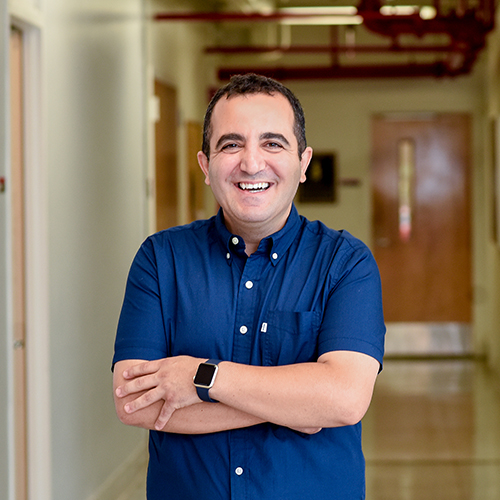Abdulkerim Eroglu

Bio
Research Program Overview
The Eroglu lab at NC State University strives to describe biochemical routes and downstream signaling effects of carotenoid metabolism by the gut microbiota in mammalian organisms. We are investigating the role of carotenoids in the gut microbiota and in mediating microbe-host interactions. The overall objective of our research program is to harness carotenoid metabolism in the gut microbiota and to reveal implications for host inflammation.
We are seeking answers to three BIG BEAUTIFUL BIOLOGY QUESTIONS in our team.
- How do carotenoids modulate the gut microbiota?
- Do microbially-derived carotenoids impact host inflammation?
- Can yeast exert similar changes in the gut as dietary carotenoids?
We formulated four distinctive objectives to answer these questions.
Objective 1: We aim to determine the impact of carotenoids on the mammalian gut microbiome.
Objective 2: We aim to illustrate how carotenoids impact local and systemic inflammation.
Objective 3: We aim to reveal carotenoid production pathways encoded in the gut microbiota using innovative high-throughput assays.
Objective 4: We aim to engineer probiotic yeast to release carotenoids in the mammalian gut.
We will advance knowledge by unraveling the links in the carotenoids, gut microbiota, and host inflammation by achieving these objectives. We will ultimately move the fields of carotenoid biochemistry, gut microbiome, and microbiology forward.
Research interests in Biochemistry:
- Carotenoid chemistry and metabolism
- Retinoid metabolism
- Lipid metabolism
- Functional Metagenomics
- Proteomics
- Metabolomics
- Systems Biology
- Probiotic Engineering
- Synthetic Biology
Research interests in Nutrition:
- Nutrient-Gene Interactions
- Nutrient-Protein Interactions
- Nutrigenomics
- Biomarkers
Publications
- Genetic and Biochemical Analyses Identified a Major Locus Gh-PA1 Underlying Pollen Carotenoid Accumulation and Pigmentation in Upland Cotton , Journal of Experimental Botany (2025)
- Health Beneficial Effects of Carotenoids Related to Their Interactions with Gut Microbiota , Proceedings (2024)
- The Biochemical Effects of Carotenoids in Orange Carrots on the Colonic Proteome in a Mouse Model of Diet-induced Obesity , BioRxiv (2024)
- The Carotenoids , ADVANCES IN NUTRITION (2024)
- The biochemical effects of carotenoids in orange carrots on the colonic proteome in a mouse model of diet-induced obesity , FRONTIERS IN NUTRITION (2024)
- Carotenoids in Health as Studied by Omics-Related Endpoints , ADVANCES IN NUTRITION (2023)
- Carotenoids and Their Health Benefits as Derived via Their Interactions with Gut Microbiota , ADVANCES IN NUTRITION (2022)
- Carotenoids in orange carrots mitigate non-alcoholic fatty liver disease progression , FRONTIERS IN NUTRITION (2022)
- In Situ Biomanufacturing of Small Molecules in the Mammalian Gut by Probiotic Saccharomyces boulardii , ACS SYNTHETIC BIOLOGY (2021)
- The Role of beta-Carotene in Colonic Inflammation and Intestinal Barrier Integrity , FRONTIERS IN NUTRITION (2021)
Grants
Carotenoids are naturally occurring red, orange, and yellow pigments found mainly in plants. They may function as vitamin A precursors, have important antioxidant, immunological or mediate metabolic functions. Absorption of carotenoids takes place in the small intestine, but the overall absorption efficiency from whole foods is low (~5-20%) at the level of small intestine and the remaining unabsorbed carotenoids move into the colon. Here, carotenoids can be further released and metabolized within the colon or within colon epithelial cells. The overall objective of this proposal is to determine the impact of carotenoids on obesity-associated gut dysfunction and gut microbiota. Our central hypothesis is that carotenoids escaping the absorption in the small intestine can be transformed by the gut microbiota in the colon, and these undigested carotenoids are available to the gut epithelium and protect against obesity-associated gut dysfunction. In aim 1, we will elucidate the molecular mechanisms of action of major dietary carotenoids on inflammatory transcription factors and gut barrier integrity in colon epithelial cells. In aim 2, we will determine the impact of carotenoids on obesity-associated gut dysfunction and metabolic endotoxemia, and intestinal barrier function in a diet-induced obesity animal model. In aim 3, we will characterize diet-induced changes in the gut microbiota resulting from a carotenoid-rich diet, utilizing metagenomics and metabolomics. We believe that the results of this study will increase demand of carotenoid rich plants. Finally, the findings of this proposal will be translated to commercial use of plants rich in carotenoids.
We propose to engineer yeast to deliver intracellular molecules to the mammalian gut